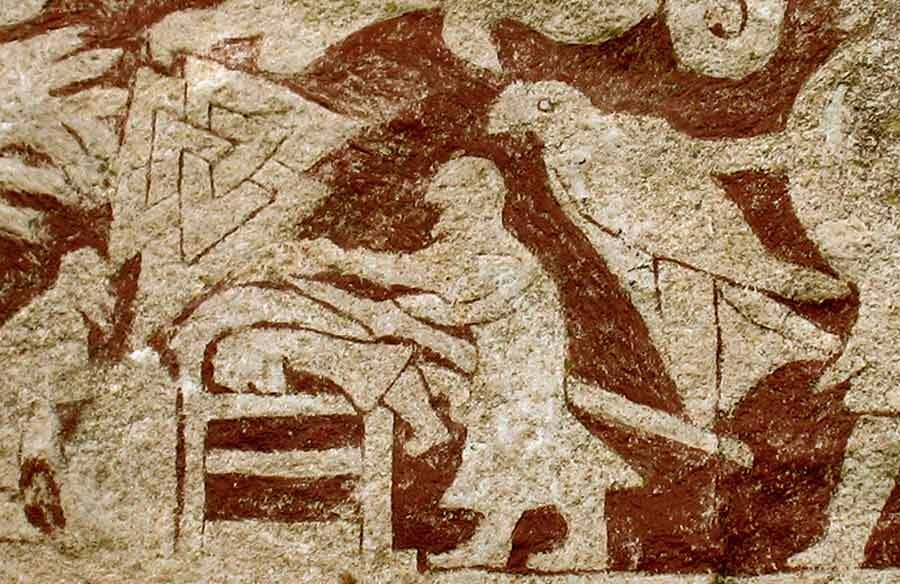The word bless is found in the earliest texts of Old English as blētsian, blēdsian, and blœdsian.
The etymology is slightly disputed. Most say it derived from the Old English word blōd, which means “blood,” but others say it derived from the word blōtan, which means “to sacrifice,” specifically a blood sacrifice. Either way, this is a pre-Christian word rooted in pagan ritual.
Whether it’s blōd or blōtan, the same basic idea emerges. To blēdsian is to consecrate, to hallow something with blood.
As words tend to do over time, bless spread its arms and gathered in a few more meanings, and it’s not too difficult to see how. Early translators used the word blēdsian for the Latin benedico and Greek εὐλογέω, and these in turn were used as translations of the Hebrew ברך. So the word bless took on all of the meanings we commonly use it for today:
to praise, celebrate with praises
to invoke blessings
to consecrate a thing with solemn prayers
to ask God's blessing on a thing
pray God to bless it to one's use
pronounce a consecratory blessing on
of God
to cause to prosper, to make happy, to bestow blessings on
favoured of God, blessed1
You might ask why did early English Christian translators and missionaries choose a word seeped in dark pagan practices for their translation rather than use another word?
Well if you didn’t ask, the Oxford Etymologist, Anatoly Liberman, did, “Since they had the verb benedictare at their disposal, why did they stick so stubbornly to one of the most pagan words of the old ritual”?
Well I think I have an answer as to why this specific word blēdsian, with its very specific meaning (to consecrate with blood) was used like a coat rack to hang all the other various meanings upon it.
To sprinkle or smear the blood of a sacrifice upon someone or something was the pre-Christian ritual action of sanctification. This is not a foreign concept for anyone familiar with the Old Testament. Sacrificing living beings and using the blood for sanctification was at the core of not only pagan worship, but God-ordained Jewish worship.
For the life of the flesh is in the blood: and I have given it to you upon the altar to make an atonement for your souls: for it is the blood that maketh an atonement for the soul.
Leviticus 17:11
And Christianity, far from condemning the idea that blood sacrifice sanctifies, actually affirms it.
Indeed, under the law almost everything is purified with blood, and without the shedding of blood there is no forgiveness of sins.
Hebrews 9:22
Christianity rejects the blood of sacrificed animals, not because it’s icky or creepy or inhumane. It rejects it because it is insufficient.
For it is not possible that the blood of bulls and of goats should take away sins.
Hebrews 10:4
Christianity agrees with the pagans and Jews that without the shedding of blood there is no forgiveness of sins, but it also declares that the blood of animals wasn’t enough. A priest had to offer blood again and again and again.
But when Christ appeared as a high priest of the good things that have come, then through the greater and more perfect tent (not made with hands, that is, not of this creation) he entered once for all into the holy places, not by means of the blood of goats and calves but by means of his own blood, thus securing an eternal redemption.
Hebrews 10:11-12
Every drop of blood shed in pagan and Jewish worship pointed ultimately to the blood of Christ. Every pagan and Jewish priest had to slaughter living creatures year after year in order to cleanse and hallow people and places. But when Christ came and the missionaries preached to the English that Christ’s own blood had been shed, and that His blood was sufficient to once and for all remove their sins, the pagan roots of the word blēdsian was not a stumbling block. It was actually a perfect word to convey how Christ hallowed an unrighteous people, through the shedding of His own blood. The pagan Anglo-Saxons were thoroughly aware of what that word entailed.
And so, for the English, the word bless signifying the hallowing through shed blood, becomes itself the gospel in one word, and from that dark red root flows joy and praise and worship and the favor of God. Which, of course, is exactly how we use the word bless today.





Thank you for this! So fascinating. I love language (homeschooling the kids gave me Latin & ancient Greek) and I can speak (conversationally) two other languages...one of them I’m quite nearly fluent (it’s probably not the one you might guess).
Learning other languages opened up an entirely new universe for me. I grew up 10 minutes from the Mexican border, so Spanish was just sort of natural, but the others opened a beautiful gate through which I have entered and for which I am ever grateful.
Wow!! That’s so interesting. Glory to God!